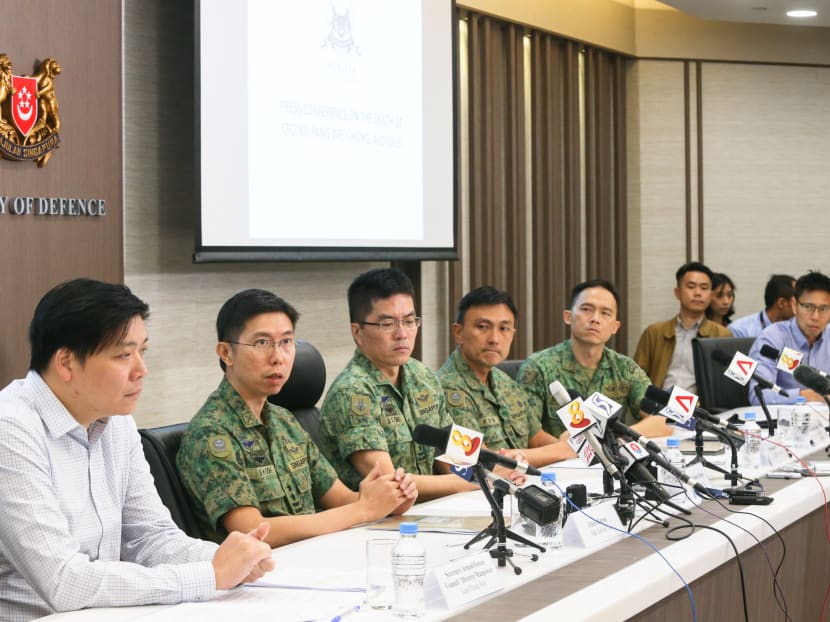Doctors treating Pang expected complications given the severe injuries: Chief Army Medical Officer
SINGAPORE — Doctors treating Corporal First Class (National Service) Aloysius Pang had expected complications even though he was conscious and able to communicate with his mother — who had flown to New Zealand to see him — the day after his first surgery.

(Left to right) Mr Lee Chung Wei, director of manpower at the Ministry of Defence and secretary of the Armed Forces Council; Major-General Goh Si Hou, Chief of Army; Lieutenant-General Melvyn Ong, Chief of Defence Force; Colonel Terry Tan, Commander of the SAF’s Combat Service Support Command and Colonel (Dr) Edward Lo, Chief Army Medical Officer, speaking at a press conference on Aloysius Pang's death.
SINGAPORE — Doctors treating Corporal First Class (National Service) Aloysius Pang had expected complications even though he was conscious and able to communicate with his mother — who had flown to New Zealand to see him — the day after his first surgery.
Colonel (Dr) Edward Lo, Chief Army Medical Officer of the Singapore Armed Forces (SAF), said that Pang suffered major trauma injuries involving multiple organs.
Responding to questions at a press conference on Thursday (Jan 24), on the injuries sustained by Pang and the treatment he received, Colonel Lo said that after complications set in, the 28-year-old’s condition “made a turn for the worse”.
Despite additional surgery and putting him on artificial life support, the Singaporean actor succumbed to his injuries at 8.45pm on Wednesday, four days after he was wounded.
Colonel Lo also gave details on the immediate treatment which was given to Pang following the incident.
He was treated on-site by an SAF doctor and his team. At that time, he was conscious and able to communicate with the doctor and the medical team, Colonel Lo said.
Pang was then evacuated by helicopter to Waikato Hospital, a tertiary hospital and regional trauma centre located in Hamilton, New Zealand. He underwent surgery that same evening.
Read also
- Army halts all high-risk training, says it ‘cannot be business as usual’ after Pang’s death
- Actor Aloysius Pang crushed by gun barrel, suffered injury to ‘multiple organs’
- Death of actor Aloysius Pang latest in series of SAF training-related fatalities since Sep 2017
- New Zealand authorities to conduct post-mortem on Aloysius Pang before repatriation
Pang, an operationally ready national serviceman, was badly injured on Jan 19 while carrying out repair works inside a Singapore Self-Propelled Howitzer with two other SAF personnel during a military exercise at the Waiouru Training Area in New Zealand. He was an armament technician from the 268th Battalion Singapore Artillery.
The SAF had asked Dr Teo Li Tserng, chief of trauma and acute care surgery at Tan Tock Seng Hospital, to help with the management and progress of Pang's condition. At the Waikato Hospital, his primary surgeon was Dr Grant Christey.
Pang first went through a “lifesaving surgery”, followed by a second planned surgery, Colonel Lo said. After the second surgery, doctors expected complications.
“You cannot have a severely injured patient and not expect complications. So, they were already expecting that. They just didn’t know when that would set in,” Colonel Lo said.
“So when he started to deteriorate, they knew that the complications had started. And that’s when the third surgery happened and subsequently, he was put on artificial life support.”
Colonel Lo said that Waikato Hospital provides an “entire suite” of clinical services, including cardiac and neuro surgeries. Pang was placed in a facility that could provide him care and address the complications arising from his injuries, he stressed.
The New Zealand authorities have said that they are waiting for the green light from Pang's family to conduct a post-mortem on the body before it can be repatriated to Singapore.
Asked when his body will be brought back, Mr Lee Chung Wei, the manpower director at the Ministry of Defence and secretary of the Armed Forces Council, said that the timeline was not confirmed and the SAF will continue to liaise with New Zealand’s authorities.
On the issue of compensation, Mr Lee said that the ministry follows the principles laid out under the civil court as well as the Work Injury Compensation Act.
“In fact, in many cases, we are much more generous. Due to confidentiality reasons, we do not speak about the specific compensation for the families,” Mr Lee said. “This is something that we will only speak to the families about.”









